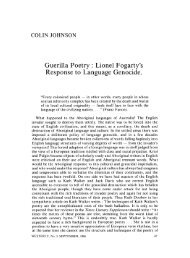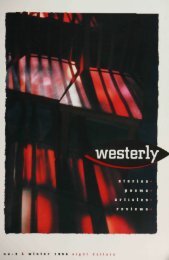flighty relation in most statements, the dressing up as it were while the body of realityis there in solid, solid nouns. To shift the emphasis as Buckley did is to take animportant philosophical tum, to subvert the cast of mind that quests for the definitiveword, the abiding truth, and to opt for flexibility. His own late phrase to describehimself denies the absolutes of a Tradition, if by that we mean somethingcompellingly revealed, yet it doesn't loosen his claim on the traditional. For 'thetraditional' has much to do with what he thought about poetry, and particularlywith what he meant by the rhythm of a writer.It is clear 1 think that mostly when Buckley spoke of rhythm he didn't have inmind simply the metrical disposition of language, nor that enchanted suspensionfrom the ordinary which Yeats believed rhythm produced. One might of course sayrather a lot about Buckley's own verse along those lines, how his early poems sooften carry the impress of Yeats in ways that are immediately recognisable:Spirit that has its counterposeIn rock, or wave, or balanced tree,Sensed once in her, made now the choiceOf Time that is his own ally.("And Yet Her Spirit Calls Usj 7The mere fact of using octosyllabics drives the rhythm to echo Yeats. But Buckleydeliberately moved from that lyric and derivative catch to the voice as coming muchtoo easily, as too patently demonstrating what he called his "softness". He workedat the harder, plainer line that he perfected in his last three books, solving the problemas he described it "of slowing my poetry down", avoiding anything as he said thatlooked "too neat".8 Usually, though, it was of something quite wider he spoke whenhe touched on rhythm.Buckley once said in an interview "I think that people develop or fail to developa very strong rhythmic sense in life". There are times in reading him, whether inverse or prose, when one thinks perhaps of that now unfashionable philosopher HenriBergson, his running the notion of evolution alongside the artist's personaldevelopment, so that rhythmic or artistic time, as he called it, circumvented themechanistic time of nature. There's a whole line of predisposition that such a wayof thinking entails, a way which would include Yeats quite as much as it would,say, Robert Frost. As Buckley applied it to himself, "it just so happened that when1 started to feel the wonder of the world most acutely, when 1 was very young, thiswonder started to express itself in miniscule rhythms and with perceptions that 1now take to have been poetic".9 There is a direct relation between thinking like this,and thinking two other things which follow from it: that rhythm implicates one insomething larger than oneself, and that this is also, if not the basis, then at leasta key to religious thought.We're familiar with Yeats's celebrated claim in his essay on Magic in 1901 "Thatthe borders of our minds are ever shifting, and that many minds can flow into oneanother, as it were, and create or reveal a single mind, a single energy."10 His claimsfor "the great memory", the fact that it might be tapped by symbols and its variouscurrents invoked, may even be the single most important belief that his poetrydeclares. It is a view that rides easily enough beside lung's archetypes, and withthose many descriptions that anthropologists and philosophers applied to mythology- a mode of thinking that Suzanne Langer called "a subject greater than anyindividual ... a sphere of activity in the real world, because what it symbolisesbelongs to the real world". I I Yeats, in a Wildean tum of phrase, designated modemscience as the critique of myths, telling Sturge Moore "there would be no Darwin,had there been no book of Genesis ".1252 WESTERLY, No.2, JUNE, 1989
Buckley found no problem in quoting one of Freud's essentially dismissive phrasesabout religion in putting his own position. "I feel that the intuitive, sometimestelephathic, entry into communication with other lives and with forces of the Universeis a process which . . . some scientists . . . [and] certain kinds of writers are bestat, and I think this is the key religious act: to try to experience, to understand andsometimes extend what Freud called the 'oceanic feeling'." "There are," he added,"probably better names for it."13Buckley, one might notice, entertained a more considered attitude to science thanmany poets, a point that became clear when he expressed his scepticism about themore extravagant claims ofliterary theory. It was at a time when one of his colleaguesliked to quote Paul de Man's self-stroking apothegm that "the poetician is now theequal of the poet", and when a fellow-professor's book repeated that now ratherpasse claim that theory was a quasi-science. But as Buckley pointed out, any overridingtheory "would have to be a theory of language, and if it is a theory of languageit would have to be a theory of the brain. Academics do not seem to worry aboutthis sort of thing, but if I was going in for language theories I really would learnsome physical science, in fact I would need to learn a lot of various sorts fromneurology to bio-chemistry, but my theoretical colleagues don't do that." The specificinstance he gave was in discussing that basic tenet of structuralism, the binarystructure of thought. "There is no scientific reason to suppose that things must bedivided in a binary way. That is just a metaphoric convenience."14 But he did notbuy into such arguments, I think, because he found them irrelevant. He would neitherread nor write better because of them. Also, I think, the fact that Buckley had suchcommitted political views about Ireland, and that he saw literature as a communalsocial force, drove him towards not a naive mimeticism, but to a view he sharedwith both black and Eastern European intellectuals - his refusal to concede anepistemological wedge between experienced life and an insulated theory of text. ISBut to take up again that phrase of his, "the forces of the universe", which hehad used also in his essay "Specifying the Sacred". He speaks there of "the impulseto establish the sense of man's life and his human relationships as being . . . bondedwith forces in the universe, which have their correlations in his own psychic life".There is a nest of related convictions that sentence carries with it, which might becrudely put into the formula, rhythm = religion = poetry = the sense of oneself. Theterms might be arranged in any order and their cog~ncy stilI holds, a chain ofconvictions as serviceable to the agnostic as to the believer. For the activity of poetryis inevitably attuned to the mental structure that permits it: "It might be thought ...that the very self-doubt of the poet is a testimony to, if not a proof of, his almostunwittingly persistent commitment to the writing of poetry as a sacred act and anaspiration to self-completion".16I believe that was a view Buckley continued to hold, which is why that adjectival'Catholic' remains so potent. As a kind of liberated modifier it implies very littleabout one's relation with the Church at a specific historical moment, although anybiographer of Buckley will have to attend carefully to why, and how, one of thestrongest voices in Australian Catholicism so altered course in those few years thatpreceded The Golden Builders, and why any reasons he publicly offered are onlypartially complete - such remarks as "I would say, in general, my growth has beena growth from dogmatism, cockiness, ideology into certainty."I? Or the bald enoughgeneralisation that "There is a certain phoniness in the denominational stance."18Yet to a reader of his poetry, the persistence of "Catholic" has to do with thefact that primarily Buckley is an "incamational" poet, if I might be allowed thatword too without doctrinal strings. It is a word he himself used of both Blake andYeats. If defines the kind of poet who sees his own thoughts, his own experience,as inevitably implicated in that network of energies which relates him to both theWESTERLY, No.2, JUNE, 1989 53
- Page 3 and 4: CONTENTSWESTERLYVOLUME 34, No.2, JU
- Page 5: WESTERLYa quarterly reviewISSN 0043
- Page 8 and 9: JAN KEMPTo My Father, M.H.K.My fath
- Page 10 and 11: JAN KEMPThe GypsySuddenly before yo
- Page 12 and 13: WONG PHUI NAMA Death in the WardThe
- Page 14 and 15: WONG PHUI NAMCousinI had to call to
- Page 16 and 17: WONG PHUI NAMObitIt is as thin smok
- Page 18 and 19: So thus I lie here fearful of movem
- Page 20 and 21: VIRGINIA BERNARDA ValedictionWhen N
- Page 22 and 23: "Yeah, yeah," I call, returning the
- Page 24 and 25: she flops for a bit, slurps her tea
- Page 26 and 27: well her students did, she was neve
- Page 28 and 29: English or Indian, that they had th
- Page 30 and 31: ANDREW TAYLORSpringSpring is a dive
- Page 32 and 33: CAROL SElTZERAiming for the MouthTr
- Page 34 and 35: GRAEME WILSONA Selection of Japanes
- Page 36 and 37: a highly ambivalent attitude to his
- Page 38 and 39: Esson attended some rehearsals of T
- Page 40 and 41: the literary life of Bloomsbury. Lo
- Page 42 and 43: Without Yeats Esson would quite lik
- Page 44 and 45: "What theatre do you have in Austra
- Page 46 and 47: In the back room Esson could feel t
- Page 48 and 49: "When we started our little theatre
- Page 50 and 51: a screen against a wall. A theatre
- Page 52 and 53: VINCENT O'SULLIVANSinging Mastery:
- Page 56 and 57: living and the dead; that places hi
- Page 58 and 59: quite diverse traditions towards th
- Page 60 and 61: WARRICK WYNNEThe Wetlands (for Liam
- Page 62 and 63: JAN OWENSmileOur mother aimed the b
- Page 64 and 65: RICHARD KELLY TIPPINGOlympic Airway
- Page 66 and 67: DAVID REITERBear by the Jasper Road
- Page 68 and 69: (At twenty eight you did not bother
- Page 70 and 71: left, would have risen and walked o
- Page 72 and 73: He had hair like mine used to be, t
- Page 74 and 75: OLIVE PELLThe QuestionTell me how t
- Page 76 and 77: BRIAN MOONANAT 515: MASS LECTURE Th
- Page 78 and 79: PETER KIRKPATRICKTear HereThe bay i
- Page 80 and 81: JOHN WINTERThe Bird ManIn wooded, p
- Page 82 and 83: KNUTE SKINNERAugust 15There's a lig
- Page 84 and 85: M.E. PATTI WALKERThe Hook"Aren't yo
- Page 86 and 87: QMNQMNQMNQMNapartheid man, this is
- Page 88 and 89: QMNQMNQMNeasy because you don't bel
- Page 90 and 91: lands or which have been taken over
- Page 92 and 93: GEOFF GOODFELLOWToo MuchDianne is 1
- Page 94 and 95: SHANE McCAULEYSouth Fremantle, Summ
- Page 96 and 97: JEAN KENTWaiting Out the DroughtWai
- Page 98 and 99: STEPHEN MAGEEJesus Falls, South Aus
- Page 100 and 101: SIMON BROWNBlue Hole, Santothe colo
- Page 102 and 103: CONAL FITZPATRICKA Brown Dog, Off A
- Page 104 and 105:
PAUL HETHERINGTONOne RoomIn teeming
- Page 106 and 107:
society, or, in the terms of the my
- Page 108 and 109:
emphasised (I think) in the referen
- Page 110 and 111:
Summer Leaves". This continues the
- Page 112 and 113:
Deficiency Bill in Western Australi
- Page 114 and 115:
invocation of pastoral near the beg
- Page 116 and 117:
particularly dreaded). The final re
- Page 118 and 119:
VINCENT O'SULLIVAN - is one of New







